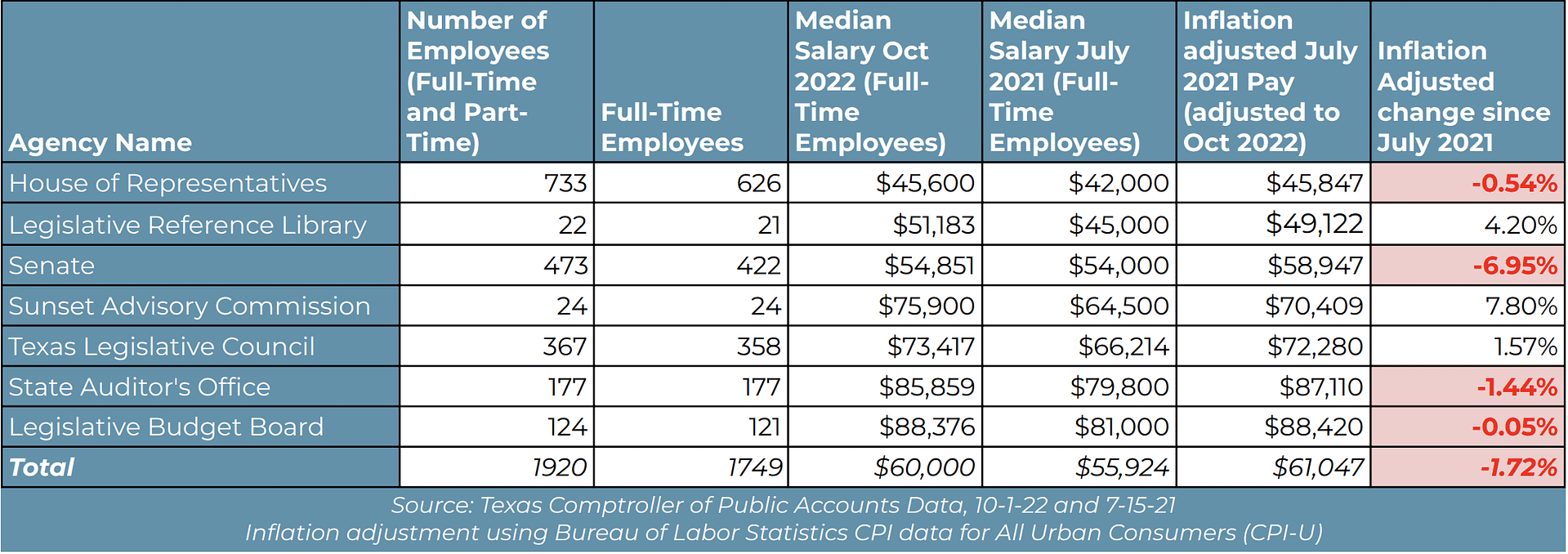Improving legislative staff salaries is a wise investment
During the special sessions of summer 2021, Texas 2036 came out in support of increasing wages for historically underpaid legislative staff. Our accompanying analysis on Article X, the relevant section of the Texas budget covering legislative agencies, illustrated just how far behind the legislative employees’ salaries had lagged in the Austin area.
The Legislature ended up reinstating the vetoed Article X funding, but many of the underlying issues highlighted by Texas 2036 were left unaddressed. With high inflation driving costs of living higher everywhere in Texas — especially so in Austin — we are highlighting legislative compensation again with updated numbers ahead of the 88th Legislature, this time with a focus on the Texas House and Senate.
The Texas House and Senate, like the other Article X agencies but unlike most other state agencies, set their own employment policies with regard to salary, leave and holidays.
Under this statutory distinction, the presiding officer for each chamber establishes the relevant employment policies for their respective chamber. In practice, each chamber passes a resolution, typically on the second day of the legislative session, that includes the chamber’s employment policies.
Currently, the median annual salary of Article X staff is $60,000. The Texas House has both the largest workforce of Article X agencies and the lowest median pay at $45,600. While this figure technically represents a $3,600 increase from July 2021, this is actually a 0.54% decrease after adjusting for inflation. The Senate’s median salary for its employees rose by $851 to $54,851, representing a 6.95% decrease when adjusted for inflation.

Most of these legislative jobs functionally require staff to work in the Austin area, with little realistic opportunity to work outside of the increasingly pricey region. The median House and Senate salaries are well below the 80% median family income, or MFI, threshold (currently $61,800 for a single person) to qualify for City of Austin assistance to purchase a home. In fact, House staff are also below the 60% MFI threshold (currently $46,380 for a single person) to qualify for City of Austin subsidized affordable rental units.
The graphic below compares the percentage growth, adjusted for inflation, of the median annual salary for full-time Article X employees to the most recent U.S. Census projections of the median rent and home price in the Austin area from 2000 to 2021 and from 2011 to 2021. The data shows that both median rent and home prices have significantly increased in comparison to the lagging median income of full-time Article X employees over this period.

As was highlighted in a recent House Administration hearing and in recent legislative sessions, legislators themselves have spoken to the difficulties in retaining qualified and experienced employees to manage and run day-to-day operations of their Capitol and district offices.
For Texas taxpayers, quality staff means a better customer service experience for the people interacting with an elected official’s staff. An experienced staffer will know how to take in and triage constituent issues, promptly routing them to a relevant state agency and then following up appropriately both with the agency and the constituent, for example. That could mean a staff member who is a go-to subject matter expert on a policy topic for which their elected official serves on the related legislative committee. Or it could be the staffer who manages the member’s schedule well, ensuring the member has a chance to attend every meeting, appearance and event.
Losing the intellectual capital of an expert means elected officials and staff colleagues may lose an internal resource on a given issue. Given the compressed nature of the legislative session, this expertise inside an office or committee can often mean the difference between the passage or failure of policy initiatives. Failure could mean two more years before a good solution gets another chance before the Legislature.
The Texas House and Senate have an opportunity early in session to increase operating budgets for their members. House members in particular face a greater crunch given their operating accounts are utilized not only for salaries, but also for rent, utilities, office supplies, shipping, printing as well as most travel.
Some House members already have various draft proposals to increase the monthly allocation to each House member, including some with a mechanism to adjust for inflation each session.
Legislative employees are not the only state employees feeling the crunch of inflation. In the coming weeks and months, we plan to highlight different types of state employees and the issues created by decreasingly competitive compensation. We will also show how this impacts our government’s ability to attract and retain talent to deliver the excellent service that Texans expect for their tax dollars.
